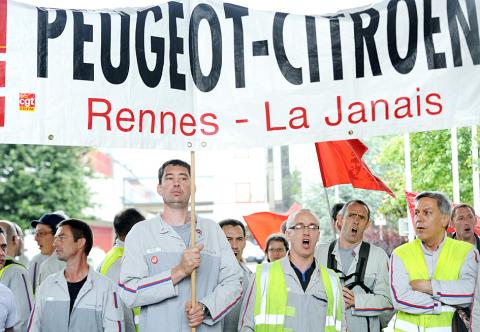PSA Peugeot Citroen’s decision to close a factory and cut an additional 8,000 jobs is unacceptable, French President Francois Hollande has said, pledging to lean on Europe’s second-biggest carmaker to renegotiate the plan.
Peugeot said on Thursday that it is to cut a total of 14,000 jobs and shut an auto plant in France for the first time in two decades to stem widening operating losses.
“The plan in the current state is not acceptable,” Hollande said on Saturday on French television.

Photo: AFP
Hollande was elected in May, promising to prevent a “parade of firings” after the election.
Peugeot’s shares plunged 7.7 percent on Friday on concern that the government may amend Peugeot’s decision to reduce costs and trim production, but there is not much wiggle room to do so, said Antonio Barroso, an analyst at the global risk research and consulting firm Eurasia Group in London.
“The range of options is limited,” Barroso said. “The Peugeot crisis is a powerful reminder of one of the most important problems facing France, which is lack of competitiveness.”
Hollande said he will consider incentives to spur sales of environmentally friendly cars and study the possibility of providing credit for vehicle purchases, though he will not adopt cash incentives like former French president Nicolas Sarkozy’s administration did to counter a recession in 2009.
With jobless claims at a 12-year high and the unemployment rate at 10 percent, Hollande said that generating jobs is his top priority. Besides Peugeot, companies including Air France-KLM Group, Carrefour and drugmaker Sanofi are mulling staff reductions in the face of stalling economic growth.
“It’s true we have a competitiveness problem,” Hollande said on Saturday. “There is an effort to be made, but it needs to be shared fairly.”
The government wants to avoid cutting salaries, but is considering shifting some social charges currently paid by employers to the social charges tax, which is paid on all forms of income including wages, pensions and capital gains.
The economic situation is already costing the Socialist president politically. Support for Hollande has dropped 7 points in the past month to 56 percent, according to an IFOP poll published on Wednesday. The survey of 1,005 voters has a margin of error of about 3 percentage points.
“Peugeot is an emblematic case that will leave its mark on people,” said Jerome Fourquet, a pollster at IFOP in Paris. “The political stakes are huge.”
Peugeot, Renault SA and Fiat SpA have posted the biggest sales declines this year in Europe, where Peugeot now expects the car market to contract 8 percent. The French carmaker has been consuming about 200 million euros (US$245 million) in cash monthly since the middle of last year.
The company will stop production at its 39-year-old factory in Aulnay, on the outskirts of Paris, in 2014. It will also lower production at a plant in Rennes to slash operational costs.

Taiwan Semiconductor Manufacturing Co (TSMC, 台積電) last week recorded an increase in the number of shareholders to the highest in almost eight months, despite its share price falling 3.38 percent from the previous week, Taiwan Stock Exchange data released on Saturday showed. As of Friday, TSMC had 1.88 million shareholders, the most since the week of April 25 and an increase of 31,870 from the previous week, the data showed. The number of shareholders jumped despite a drop of NT$50 (US$1.59), or 3.38 percent, in TSMC’s share price from a week earlier to NT$1,430, as investors took profits from their earlier gains

In a high-security Shenzhen laboratory, Chinese scientists have built what Washington has spent years trying to prevent: a prototype of a machine capable of producing the cutting-edge semiconductor chips that power artificial intelligence (AI), smartphones and weapons central to Western military dominance, Reuters has learned. Completed early this year and undergoing testing, the prototype fills nearly an entire factory floor. It was built by a team of former engineers from Dutch semiconductor giant ASML who reverse-engineered the company’s extreme ultraviolet lithography (EUV) machines, according to two people with knowledge of the project. EUV machines sit at the heart of a technological Cold

Taiwan’s long-term economic competitiveness will hinge not only on national champions like Taiwan Semiconductor Manufacturing Co. (TSMC, 台積電) but also on the widespread adoption of artificial intelligence (AI) and other emerging technologies, a US-based scholar has said. At a lecture in Taipei on Tuesday, Jeffrey Ding, assistant professor of political science at the George Washington University and author of "Technology and the Rise of Great Powers," argued that historical experience shows that general-purpose technologies (GPTs) — such as electricity, computers and now AI — shape long-term economic advantages through their diffusion across the broader economy. "What really matters is not who pioneers

TAIWAN VALUE CHAIN: Foxtron is to fully own Luxgen following the transaction and it plans to launch a new electric model, the Foxtron Bria, in Taiwan next year Yulon Motor Co (裕隆汽車) yesterday said that its board of directors approved the disposal of its electric vehicle (EV) unit, Luxgen Motor Co (納智捷汽車), to Foxtron Vehicle Technologies Co (鴻華先進) for NT$787.6 million (US$24.98 million). Foxtron, a half-half joint venture between Yulon affiliate Hua-Chuang Automobile Information Technical Center Co (華創車電) and Hon Hai Precision Industry Co (鴻海精密), expects to wrap up the deal in the first quarter of next year. Foxtron would fully own Luxgen following the transaction, including five car distributing companies, outlets and all employees. The deal is subject to the approval of the Fair Trade Commission, Foxtron said. “Foxtron will be